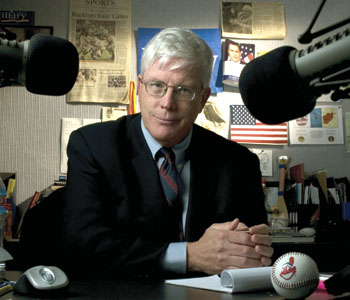How To Use Radio Advertising To Get Known As An Expert

Radio advertising is a great way to get known in your community as an financial expert and promote your upcoming events.
Your ad must lead with a attention grabbing headline to get the listeners’ interest. This keeps them from changing the station or just mentally tuning out.
Beware of letting your ad rep write your ad. Their goal is to sell ads and that’s their main skill. They may or may not be able to write ads which help you. Remember that the ad costs the same regardless of how it performs. You want a “direct response” ad so you know if your ad pays for itself or not. These type of ads include a very simple way for listeners to contact you, like an easy to remember website address or super easy phone number (for example, 334-555-7777). The most effective direct response ads repeat the website address or phone number at least 3 times in the commercial to enhance recall.
The time and cost of producing a radio commercial is far below the cost of producing an equivalent length television commercial. And if an ad doesn’t work you just record another one. Most radio stations include free production as part of your advertising buy, which includes both the copywriting and voiceover assistance.
You must choose your radio station carefully. The listening audience’s demographics must match your target market. Not your taste in music. A great ad on the wrong station won’t build your practice. Look for stations that have a large number of financially qualified listeners; some radio stations can supply you with that specific research data, especially in larger metropolitan areas. You can also reasonably assume that stations that program a format that appeals to an older demographic will in general terms be more likely to utilize a financial planner, as opposed to stations that target listeners in their teens and 20’s. Formats that perform especially well with a more affluent audience of adults over the age of 45 include news, talk, oldies, jazz and classical stations.
Radio consultant and station owner Burke Allen from Allen Media Strategies recommends that you always negotiate with the station account executive. “Electronic media sales reps tend to have quite a bit of flexibility with their per spot rate and placement so don’t accept the first thing that is offered to you.”
The two main categories of radio stations are commercial and noncommercial.
Commercial Radio Stations
Commercial radio stations play all kinds of music which appeals to all ages and social classes. As I mentioned earlier, the demographics of commercial radio vary widely so choose your station wisely.
Radio spots are typically 60 seconds long which is about 250 to 300 words. 60 seconds is plenty of time to create an effective advertisement. Remember to start out strong to keep your listeners attention.
Best to use the radio station staff to record the commercial especially when you’re promoting a seminar or other event. You want to be positioned as a financial expert not a used car salesman. “CFP” does not stand for “Certified Financial Pitchman”!
You can be the star if you use an interview format. You provide valuable information so people see it as a mini-radio show rather than a commercial. They pay attention and don’t change the channel. Here’s a simplified version of a commercial using this format:
- The announcer begins with an introduction of you and your firm. “Time for today’s Money Minute with certified financial planning professional Bob Johnson.” This acts as the headline of the ad.
- The announcer asks you a quick question, “Today’s question is ‘Does a will help me if my husband gets Alzheimer’s?’”
- You provide a clear and concise answer: “No. Wills only go into effect upon death not disability. If your husband was mentally disabled, you would need to go to court to set up a guardianship. This is costly, time-consuming, and embarrassing. Many couples avoid this problem with a living trust.”
- The announcer closes the ad with a call to action, “For a free report on estate planning essentials, call Bob Johnson of Johnson Wealth Management at 555-666-7777.” The announcer should include your USP if time permits. Remember to have them repeat your contact information at least three times to enhance recall.
Noncommercial Radio Stations
Public radio stations tend to program either a News/Talk format or classical/jazz/world music. These formats appeal to older and more affluent audiences. You won’t advertise, of course, you’ll be a “supporter”of noncommercial radio. In recent years, public radio stations have expanded what supporters can say about their businesses. For example:
“Bob Johnson and Johnson Wealth Management support the arts community and Jefferson Public Radio. With systematic planning and proven strategies, Bob Johnson helps families prepare for all stages of life from college savings accounts, to funding a busy and vital retirement, to handling long-term care needs. You can reach Bob in his Medford office at 555-666-7777.”
Listen to your local public radio station and get a feel of what they allow. Don’t be afraid to push the envelope. Somebody has in the past and you might as well push it a bit further. Perhaps they’ll allow a community announcement like this:
“Bob Johnson and Johnson Wealth Management support the arts community and Jefferson Public Radio. On Tuesday, July 5th, Bob Johnson will be holding a community seminar to help individuals and couple learn how to avoid probate and minimize estate taxes. For more details and an invitation, call Bob Johnson in his Medford office at 555-666-7777.”
These underwriter announcements are short and to the point, and are helpful not “salesy”. They work best if recorded by a well-known and well-liked station announcer, but are often read live at public stations.
When should your ads run? Morning and afternoon drive times are the most listened to time on radio, as about 70% of radio listening happens in-car. I helped one advisor who had a 15 minute “Financial Forum” every business day at 8 a.m. This time slot worked great. Another preferred time might be the noon news hour if the station has a large at-work listenership. Not all times are the same in terms of listening levels so try to get the best times possible.
In all cases, ask for a log of when the spots ran along with the spot name if you have several different ads running. You must know which ads are working and which ads need to be dropped. If you run ads on more than one station you may find one station works substantially better than the other. In that case, drop the loser and double-up on the winner.
Get Your Own Radio Show For Advisor Marketing Success

Getting a local radio show is a great way to get known in your community as a financial planning expert. Let’s look at the “6 C’s” of having your own radio show:
Contact. A radio show gets you in contact with hundreds or thousands of prospective clients all at once. You build chemistry, establish yourself as an expert and as brave. Not many folks would like to be put on the spot every day or every week. Your clients will enjoy hearing you on the radio and will brag on you so you’ll get more referrals.
Content. Now you’ve gotten a radio show. So what do you talk about? You could do a series of topical shows on various investing and planning areas. You could do a few shows on explaining common investment jargon. You could answer listeners’ questions. The questions could be sent in by email, folks could call your office with questions or you could take them live on air. What do you do if someone asks you a question you can’t answer? No problem, just say, “Great question. Let me do a bit of research and come back tomorrow with a complete answer.” Listeners will appreciate that you admit you don’t know it all. Live Q&A is best and you can do it after you’ve done several shows.
Counsel. You need to give general advice only. You can’t give specific advice because you don’t have the facts of their personal situation. This is a good reason for them to visit you in your office. You also need to be careful not to provide tax or legal advice. Share some air time with your lawyer and CPA and you might see some more referrals down the road.
Controversy. Be especially careful when a listener asks a political question. Your opinion might alienate half your audience. Remember most elections are decided 51% to 49%. Many listeners (and potential clients) will be adamantly opposed to socialism while equally adamant against any cuts to Social Security or Medicare! Emphasize personal responsibility and not wanting to be dependent on the government in your old age. You can take stronger positions when it comes to financial planning matters. Why? Because you are an expert and should know certain planning approaches are better for “most people.” Example, “For most people who own their own home and have over 100,000 in financial assets, estate planning with a living trust is a better option than relying upon a will.”
Cost. Small towns have smaller audiences so the cost is less. One advisor I help pays $1000 per month for a 15 minute Financial Forum show every business day. Another advisor pays $250 per hour for a one-hour weekly show in a big city. In both cases, they get some advertising spots and can cross-promote their seminars and other events.
Communication. You must learn to be clear, concise, and confident when you talk on the radio. Speak in plain English or people will tune you out! And toss in a bit of humor to be more likable and approachable. Imagine you’re speaking to just one person and you’ll be more effective (and less nervous).
How do you get started? Talk to your best clients and find out which radio stations they listen to. Contact these stations and speak with the station manager about starting your own radio show. Whether you do a 3-minute “Money Matters” or a 15-minute or one-hour “Financial Forum”, you can use radio to build chemistry and trust with thousands of people while establishing yourself as an expert in your field.
UPDATE: My friend Burke Allen has over 20 years in PR and the radio industry. He put together a program called Get Your Own Radio Show to help individuals get started in radio.
Getting Free Publicity with Press Releases

 Financial advisors, like any other business, have two ways to get noticed in newspapers, radio and television. Paid and unpaid.
Financial advisors, like any other business, have two ways to get noticed in newspapers, radio and television. Paid and unpaid.
The advantages of paid advertisements include you can guarantee you’ll be in the paper on the day you want and your control your message. The big disadvantage of paid advertisements is that they cost money! Another disadvantage of paid advertisements is that the readers, listeners, and viewers all know it’s a commercial or an ad.
How do you get unpaid publicity? By submitting press releases which talk about your company and it’s products and services. Now if you ONLY write about yourself, your company and it’s products and services, the “news” will be boring and no news editor will write about it.
Your press releases can result in news articles in two different cases.
First, your company comes out with something that is truly new. For a financial advisor, perhaps it’s a community seminar on a topic all seniors are interested in. This could be on estate planning or dealing with long-term care expenses. You might get mentioned especially if it’s a slow news day.
I wrote a press release for an advisor who held a grand opening for his new building. I knew the write reporter to get it to and followed up with an invitation to the grand opening. The reporter appeared and brought a camera. I gave him a tour and he met the building owner for an interview. Thankfully no one drowned in river and the stock market didn’t crash. So we got front page coverage including a picture of me and the new building! A couple local TV stations sent a camera crew and reporter so we made it on two TV stations 11 o’clock news. This is coverage that money just can’t buy. Done with press releases and some personal follow-up.
The other way to get publicity is to tie you and your company to a local or national story of interest. When Michael Jackson died, the news coverage mentioned he had a living trust. You could promote your expertise in this area to local reporters. You might get called for a quote. Or you could announce your next living trust seminar and tie it back to the news story.
Of course, press releases have two main disadvantages. The paper may not print anything at all. This happens all the time so your time is largely wasted. You can put a “Press Release” page on your website and post all your press releases. Your press releases will help your rankings on Google and give your readers more information about your company.
Or they include the information and change the story to fit the editor’s desired angle. Or they might make a typographical error.Once, I sent a press release for a marketing seminar I was holding at 7 in the morning. The paper printed my press release word-for-word with one little exception. It showed the time as 7 pm. Guess what? I held the seminar at 7 pm because the paper was the main form of publicity.
When should you submit your press release? For newspapers, try to fax or email it in a week before your event. Television works on a shorter news cycle so 3 days in advance is plenty.
Like so much of marketing, you need to make a consistent, sustained, and purposeful effort with press releases. Set a goal of sending out one press release per month. You’ll find it becomes easier as you do it more often. You’ll get known to news editors and this can result in them calling you. This might result in a new client or two and will help you establish yourself as an expert in your field.
Advisor Marketing with Ready Answers for Difficult Questions
 As a financial advisor you’re used to asking your clients hard questions.
As a financial advisor you’re used to asking your clients hard questions.
- What’s your tolerance for risk?
- Are you okay with short-term losses to make long-term gains?
- Who gets your money when you die?
Sometimes clients have ready answers. Other times a couple will look at each other and tell you, “We need to talk about this.” No problem, you don’t expect a ready answers for these tough questions.
But what about when your client or a prospective client asks YOU some tough questions? Are you ready with good answers?
In a recent issue, Fortune magazine named Apple CEO Steve Jobs, the “CEO of the Decade.” Steve Jobs is a master showman and watching his product intros is always a kick…even if you’re a hardcore Windows/Blackberry guy. This quote really jumped out at me:
A key Jobs business tool is his mastery of the message. He rehearses over and over every line he and others utter in public about Apple. ~ Fortune
For the curious, you can watch him in action below when he introduced the Macintosh (1984), iPod (2001) and iPhone (2007). He only had one chance to make a good first impression. So Steve practiced his lines over and over again and nailed the presentation.
Fortunately, you’ll likely be alone with your client in your office or conference room. A larger venue might be a living trust seminar with 25 or 30 people in the room. While a smaller stage than Steve Jobs commands, your ability to provide a sincere and convincing answer can win or lose the account.
What might you get asked? I dug around the Internet and found numerous lists of “questions to ask your financial advisor.” Here are some highlights:
5 Questions To Ask a Potential Financial Advisor
1. Tell Me About Your Ideal Client
Any good financial advisor will have an area of expertise. You want someone who has expertise working with someone like you. If you’re about to retire, and they tell you they work with young families, maybe this isn’t the person for you. Find a financial advisor whose ideal client sounds very similar to your situation in terms of age, stage of life, and asset level.
3. Ask A Potential Financial Advisor to Explain A Concept To You
What you are looking for here is, can you understand their explanation? If they speak over your head, or their answer makes no sense, then move on. You want to work with someone who can explain financial concepts to you in language you can understand.
Below are five concept oriented questions to consider asking:
- What is passive vs. active investing?
- How do you determine how much of my money should be in stocks vs. bonds?
- What is a laddered bond portfolio?
- How do you determine how much money I can safely withdraw each year without running out?
- What do you think of annuities?
Seven Questions to Ask When Picking a Financial Adviser (The Wall Street Journal)
As investors look for guidance in these troubled markets, one question looms above all others:
Whom can you trust?
During boom times, it was easy to hire a financial adviser and put your money on autopilot. Now the market is in chaos and thousands of investors have been devastated by fraud, with Madoffed threatening to become an all-too-common verb.
Small wonder that many investors are getting reluctant to put their faith in experts. More than three-quarters of individuals with at least $1 million to invest intend to move money away from their financial advisers, and more than half intend to leave their advisers altogether, according to Prince & Associates Inc., a market-research firm.
The trouble is, many investors don’t have the time or expertise to make all of their own investment decisions. So, having a professional on your side is crucial. But how can you guarantee that your expert is reliable?
6. Can the adviser put it in writing?
Ask for a formal written outline of the services the adviser will be providing and what fees you will be paying. By setting concrete expectations, you can determine if an adviser is going to, say, “help you set goals and do budgeting or just make investment decisions,” says Ellen Turf, chief executive of the National Association of Personal Financial Advisors.
For instance, you can ask advisers to spell out what they think you are trying to achieve and what they think you should do to get there, including investment strategies, specific benchmarks and suggested financial products. If advisers can’t explain their plan in simple terms, another red flag should go up. Secret strategies like those touted by Mr. Madoff are no longer acceptable, Mr. Sonnenfeldt says.
Also ask advisers to spell out who else stands to gain from your relationship — such as affiliated broker-dealers and insurance agencies — as well as exactly how much the adviser, the adviser’s firm and all those other parties will earn from your business.
Finally, find out whether the advisers are going to take on fiduciary responsibility, in which they are legally bound to act in your best interest. If advisers don’t take this oath, they’re only required to sell you products that are deemed suitable for you — and those may not always be the best fit for your financial situation or objectives.
Eight Questions to Ask Your Financial Advisor
(1) Do you use a comprehensive approach to financial planning by directing our efforts around a written plan based upon my specific goals?
(2) How will you communicate, both initially and through time, what I am paying you, how I am paying you, and what I am receiving for it?
(3) Do you have any conflicts, limitations, or encumbrances that I need to be aware of, and will you communicate them in the future if any arise?
(4) What is your core philosophy regarding your work? What results would lead YOU to conclude that our work together is successful?
(5) Are you acting as a specialist or a generalist? In either case, who will be coordinating the specialists that will be needed over time to address my changing needs?
(6) How often do you meet with clients? What do those meetings look like, and what communication methods do you use between meetings?
(7) Will I be working directly with you, or through skilled assistants, and what procedures should I expect as far as phone calls made and received, mail sent and received, etc.?
(8) What issues, topics, or challenges should I NOT be concerned about, despite what I may hear through the media; what issues, topics, or challenges SHOULD I be concerned about, despite not hearing much about it; and, how will you help me do that?
How to Choose a Planner (CFP Board)
2 Q. What are your qualifications?
A. The term “financial planner” is used by many financial professionals. Ask the planner what qualifies him to offer financial planning advice and whether he is recognized as a CERTIFIED FINANCIAL PLANNER™ professional or CFP® practitioner, a Certified Public Accountant-Personal Financial Specialist (CPA-PFS), or a Chartered Financial Consultant (ChFC). Look for a planner who has proven experience in financial planning topics such as insurance, tax planning, investments, estate planning or retirement planning. Determine what steps the planner takes to stay current with changes and developments in the financial planning field. If the planner holds a financial planning designation or certification, check on his background with CFP Board or other relevant professional organizations. [Nice to see they included ChFC along with CFP.]
15 Questions to Ask a Financial Advisor [written by a CPA who is also a financial advisor]
3. Can the advisor explain their investment philosophy in simple language? A 10-year-old should be able to understand the logic of the investment philosophy.
5. Ask the advisor, “why are you in the business?” “Besides your alarm clock, what makes you get up in the morning?”
6. Can evidence be presented to back up the advisor’s investment approach?
7. Where is the advisors own money invested?
That last question might stump many advisors. Would you use a realtor to buy a house who has rented his whole life? Or buy stocks through a stockbroker who keeps all his money in money market funds? Would you keep your savings with a banker who keeps his savings under his mattress? Probably not.
So my advice to you is to click through a few of these articles and try to see things from your client’s perspective. You want to develop clear, convincing and sincere answers to these types of questions. Practice in front of a mirror. Ask your spouse to role play. Or use your webcam to record your answers and give them a critical view. You’ll be glad you did.
Now watch what careful preparation did for Steve Jobs. He made a great first impression. And followed through later on what he said. And prospered. Go and do likewise!
http://www.youtube.com/watch?v=G0FtgZNOD44
http://www.youtube.com/watch?v=gQ2CMMdowu0&feature=related
